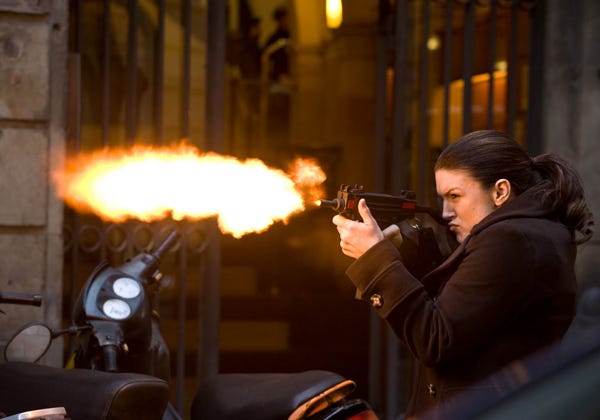Haywire

There’s a fleeting moment of fascinating tension near the finale of “Haywire” — subtle sleight-of-hand in Steven Soderbergh’s otherwise brutal, straightforward action film.
Double-crossed and framed for multiple murders in Ireland, mercenary Mallory Kane (Gina Carano) schedules a meet at an airfield. She, and we, hope the man with whom she’s rendezvousing can be trusted … but no one is entirely sure.
As skepticism spikes, there’s a shimmer of movement behind a jet on the tarmac. Running feet? A vehicle? We clench, anticipating another ambush for Mallory to dodge, and it’s revealed as … a tumbleweed, rolling away as fast as it entered. Leave it to Soderbergh to milk a breathless moment from a dusty trope of vengeance Westerns.
This unexpected gasper is also one of few scenes in “Haywire” to divert your gaze from Carano — a mixed martial-arts fighter making her film debut for Soderbergh in the same way porn actress Sasha Grey did in “The Girlfriend Experience.” That is to say, less as an actress than a performer in an element where she excels — delivering kidney punches, knees to faces and submissive, tendon-tearing arm locks.
Yes, Carano musters up something similar to tenderness in two tiny moments. But it’s easy to imagine Soderbergh (inspired to build a film around Carano after stumbling on one of her televised fights) simply telling his star to do what she would in the ring — analyze weaknesses, exploit without remorse, triumph unequivocally.
The result is an electrifying film of hand-to-hand combat with spatial clarity, a sensual charge and splendid fight choreography. Simple pleasures, those, but ones rarely found in today's onslaught of CGI-augmented battles and incomprehensible editing.
“Haywire” is a primo genre picture through and through. And, after the apocalyptic disaster “Contagion,” it's a consecutively successful diversion for Soderbergh. But the film and Carano pack a persuasive wallop. Here, for the first time in a long time, is a cinematic heroine you truly believe could lay hurt on people — constantly taking furious, flying leaps at her foes.
Carano is no wispy waif a la Angelina or Zoe. Sturdy, statuesque and sexy, she's attractive without being airbrushed. Bless the precision of Soderbergh’s digital cinematography to refreshingly reveal the slightest trace of acne scars on a woman still ravishing by most standards.
As a character, Mallory claims discomfort as eye candy. That’s very true. Her wiles are much wilder; Mallory exploits the way men see her as a challenge to be conquered. Thanks to this, neither Soderbergh’s camera nor Lem Dobbs’ snappy script objectifies her. If anything, she’s sneaking a peek at Michael Fassbender’s abs; then again, she could be sizing up how pliable they will be under her fists.
Fassbender’s Paul is but one in a barrage of beefy dudes to whom Mallory lays waste, arguably the best in a series of energizing combat scenes unadorned by a score or Foley effects. (Instead, David Holmes’ lounge-groove score is shaken like a martini at all the right moments.)
Channing Tatum, Ewan McGregor, Antonio Banderas, Bill Paxton and Michael Douglas round out the cast as those who may, or may not, be Mallory’s enemies. Who they play and what they do is tangential to what makes “Haywire” work. Honestly, there's not much to care about, or for, in the moments when Dobbs derails momentum to tie together every last plot thread.
It’s anyone’s guess whether Carano will have a film career outside of interchangeably taciturn heroines — a distaff Jason Statham, if you will. In the meantime, enjoy a director having fun and an athlete convincingly kicking ass.
